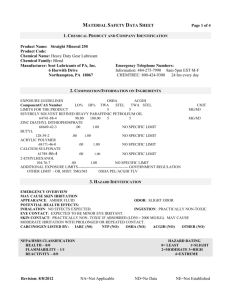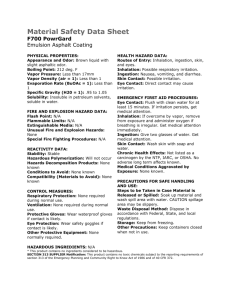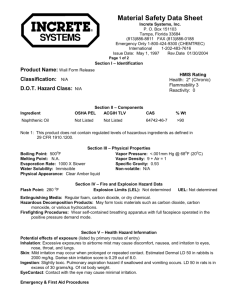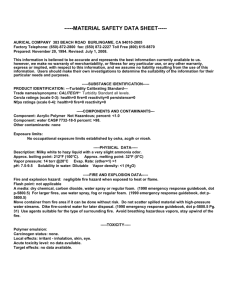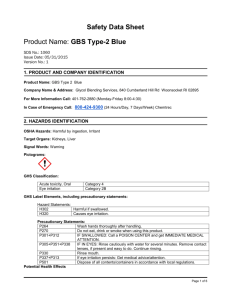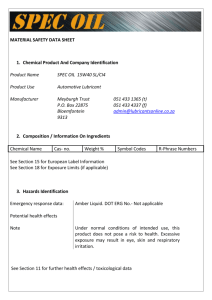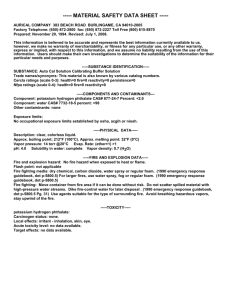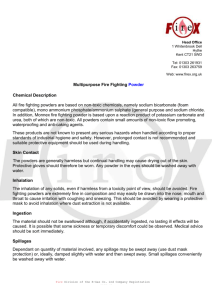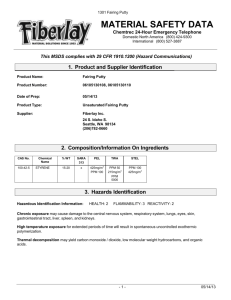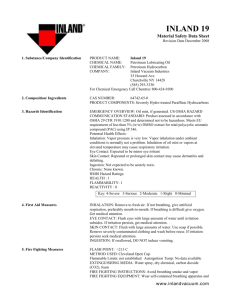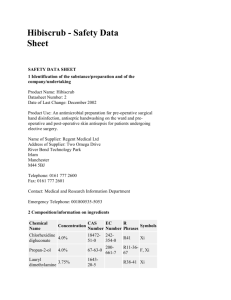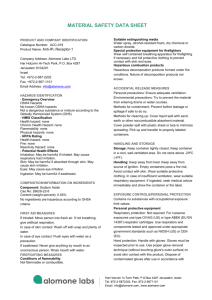Product Name: Industrial Gear Oil 680
advertisement
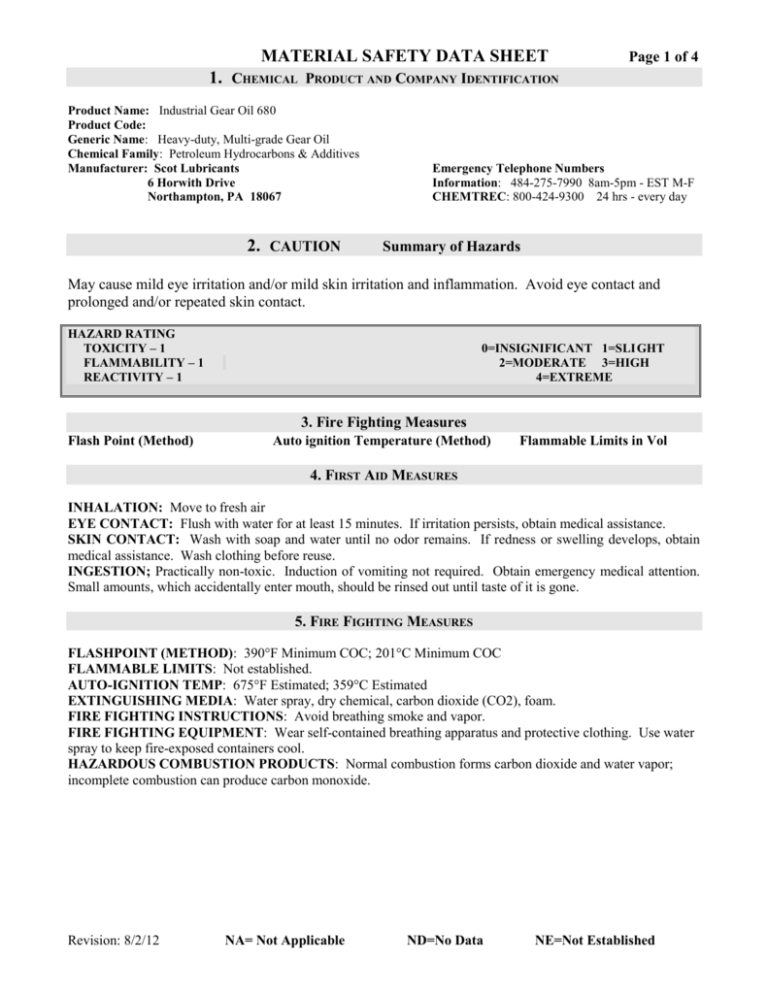
MATERIAL SAFETY DATA SHEET Page 1 of 4 1. CHEMICAL PRODUCT AND COMPANY IDENTIFICATION Product Name: Industrial Gear Oil 680 Product Code: Generic Name: Heavy-duty, Multi-grade Gear Oil Chemical Family: Petroleum Hydrocarbons & Additives Manufacturer: Scot Lubricants 6 Horwith Drive Northampton, PA 18067 2. CAUTION Emergency Telephone Numbers Information: 484-275-7990 8am-5pm - EST M-F CHEMTREC: 800-424-9300 24 hrs - every day Summary of Hazards May cause mild eye irritation and/or mild skin irritation and inflammation. Avoid eye contact and prolonged and/or repeated skin contact. HAZARD RATING TOXICITY – 1 FLAMMABILITY – 1 REACTIVITY – 1 0=INSIGNIFICANT 1=SLI GHT 2=MODERATE 3=HIGH 4=EXTREME 3. Fire Fighting Measures Flash Point (Method) Auto ignition Temperature (Method) Flammable Limits in Vol 4. FIRST AID MEASURES INHALATION: Move to fresh air EYE CONTACT: Flush with water for at least 15 minutes. If irritation persists, obtain medical assistance. SKIN CONTACT: Wash with soap and water until no odor remains. If redness or swelling develops, obtain medical assistance. Wash clothing before reuse. INGESTION; Practically non-toxic. Induction of vomiting not required. Obtain emergency medical attention. Small amounts, which accidentally enter mouth, should be rinsed out until taste of it is gone. 5. FIRE FIGHTING MEASURES FLASHPOINT (METHOD): 390°F Minimum COC; 201°C Minimum COC FLAMMABLE LIMITS: Not established. AUTO-IGNITION TEMP: 675°F Estimated; 359°C Estimated EXTINGUISHING MEDIA: Water spray, dry chemical, carbon dioxide (CO2), foam. FIRE FIGHTING INSTRUCTIONS: Avoid breathing smoke and vapor. FIRE FIGHTING EQUIPMENT: Wear self-contained breathing apparatus and protective clothing. Use water spray to keep fire-exposed containers cool. HAZARDOUS COMBUSTION PRODUCTS: Normal combustion forms carbon dioxide and water vapor; incomplete combustion can produce carbon monoxide. Revision: 8/2/12 NA= Not Applicable ND=No Data NE=Not Established Industrial Gear Oil 680 Page 2 of 4 6. ACCIDENTAL RELEASE MEASURES SPILLS OR LEAKS: Contain spills, advise EPA, state agency, if required. Absorb on inert material, shovel, sweep, or vacuum spill. 7. HANDLING AND STORAGE NFPA Class IIIB Storage. Wash thoroughly after handling. 8. EXPOSURE CONTROLS/PERSONAL PROTECTION VENTILATION: Ventilate as needed to comply with exposure limit. General Dilution ventilation acceptable. PERSONAL PROTECTIVE EQUIPMENT – EYE: Splash proof chemical goggles recommended to protect against splash of product. GLOVES: Protective gloves recommended when prolonged skin contact cannot be avoided. The following glove materials are acceptable: polyvinyl chloride (PVC); neoprene; nitrile; polyvinyl alcohol; viton. RESPIRATOR: Concentration in air determines protection needed. Use only NIOSH certified respiratory protection. Respiratory protection usually not needed unless product is heated or misted. Half-mask air purifying respirator with dust/mist filters or HEPA filter cartridges is acceptable to 10 times the exposure limit. Full-face air purifying respirator with dust/mist filters of HEPA filter cartridges is acceptable to 50 times the exposure limit. Protection by air purifying respirators is limited. Use a positive pressure demand full-face supplied air respirator or SCBA for exposures above 50X the exposure limit. If exposure is above IDLH (immediately dangerous to life and health) or there is the possibility of an uncontrolled release or exposure levels are unknown, then use a positive pressure demand full-face supplied air respirator with escape bottle or SCBA. OTHER: If contact is unavoidable, wear chemical resistant clothing. The following materials are acceptable as protective clothing materials: polyvinyl alcohol (PVA); polyvinyl chloride (PVC); neoprene; nitrile; viton; polyurethane. Launder soiled clothes. 9. PHYSICAL AND CHEMICAL PROPERTIES APPEARANCE/ODOR: AMBER FLUID/SLIGHT ODOR VAPOR PRESSURE <0.0001 (MM HG @ 20°C) MOLECULAR WEIGHT: N/A (G/MOLE) SOLUBILITY IN WATER: NIL (% BY VOLUME) EVAPORATION RATE: 1000X SLOWER (ETHYL ETHER=1) SPECIFIC GRAVITY: 0.86 (WATER=1) VISCOSITY: 170 SUS @ 210°F 680 CST @ 40°C .BOILING POINT: HIGH MELTING POINT: N/A PACKING DENSITY: N/A OCTANOL/WATER COEFF: N.D. ODOR THRESHOLD: N.D. VAPOR DENSITY: 10+ (AIR=1) 10. STABILITY AND REACTIVITY STABILITY: Stable CONDITIONS TO AVOID: None known. MATERIALS TO AVOID: Strong oxidizing agents. HAZARDOUS POLYMERIZATION: Will not occur. HAZARDOUS DECOMPOSITION: Combustion will produce carbon monoxide and asphyxiants. 11. TOXICOLOGICAL INFORMATION FOR THE PRODUCT – INHALATION: Low acute toxicity. SKIN: Practically non-toxic if absorbed. Mild irritation with prolonged or repeated contact. EYE: Mildly irritating on contact. ORAL: Practically non-toxic. Revision: 8/2/12 NA= Not Applicable ND=No Data NE=Not Established Industrial Gear Oil 680 Page 3 of 4 11. TOXICOLOGICAL INFORMATION – cont’d SEVERELY SOLVENT REFINED HEAVY PARAFFINIC PETROLEUM OIL: INHALATION: Low acute toxicity. SKIN: Practically non-toxic if absorbed; may cause moderate irritation with prolonged and repeated contact. EYE: Minimally irritating on contact. INGESTION: Practically non-toxic if swallowed. CALCIUM SULFONATE: INHALATION/INGESTION: No data available. SKIN: Moderate irritant. Causes allergic skin reaction in animals. EYE: Moderate to severe irritation. BUTYLATED PHENOL: No data available for all routes of exposure. ZINC DIALKYL DITHIOPHOSPHATE: INHALATION: Toxic hydrogen sulfide is generated when heated above 155 deg. F. This can cause respiratory collapse, coma, or death. SKIN: Prolonged or repeated contact may cause moderate irritation, redness, drying, cracking, and dermatitis. EYE: Irritant. ORAL: Harmful if swallowed. ACRYLIC COPOLYMER: No data available for all routes of exposure. 2-ETHYLHEXANOL: INHALATION: Overexposure may cause nose/throat irritation, nasal discomfort and discharge, chest pain, cough, headache, nausea, vomiting. SKIN: Irritant. Prolonged/repeated contact may cause redness and swelling. Prolonged widespread absorption caused CNS (Brain) depression, stupor, and unconsciousness in animals. EYE: Severe irritant. May cause corneal injury. ORAL: Moderately toxic. May cause abdominal discomfort, nausea, vomiting, diarrhea, unconsciousness, and other CNS (Brain) effects. Liver and kidney injury (repeated ingestion TOLUENE: INHALATION: Vapor harmful. Overexposure to high concentration will cause eye, nose, and throat irritation. CNS (Brain) effects, dizziness, breathing difficulties, coma, and death. Reports of heart beat irregularities from massive exposure. Prolonged overexposure can cause brain, liver, kidney effects and/or damage. ORAL: Harmful or fatal if swallowed. PULMONARY ASPIRATION HAZARD: Can enter lungs and cause damage. PREGNANT: May cause mental and/or growth retardation in children of female solvent abusers. 12. ECOLOGICAL INFORMATION ECOTOXICITY: No data available. 13. DISPOSAL INFORMATION Follow federal, state, and local regulations. Not RCRA hazardous waste if uncontaminated. If “used”, RCRA criteria (ignitability, reactivity, corrosivity, toxicity characteristics) must be determined. Do not flush to drain/storm sewer. Contract to authorized disposal service. 14. TRANSPORTATION INFORMATION DOT PROPER SHIPPING NAME HAZARD CLASS ID NUMBER LABEL REQUIRED IMDG PROPER SHIPPING NAME IATA PROPER SHIPPING NAME Revision: 8/2/12 Petroleum Lubricating Oil Not regulated Not regulated Not regulated N.D. N.D. NA= Not Applicable ND=No Data NE=Not Established Industrial Gear Oil 680 Page 4 of 4 15. REGULATORY INFORMATION TSCA: This material is in compliance with the TOXIC SUBSTANCES CONTROL ACT (15 USC 2601-2629) and is listed in the TSCA Inventory. SARA 302 THRESHOLD PLANNING QUANTITY SARA 304 REPORTABLE QUANTITY SARA 311/312 REPORTING Health Health Physical Physical Physical N/A N/A Immediate (acute) Delayed (Chronic) Fire Sudden Release of Pressure Reactive No No No No No When a product and/or component is listed below, the regulatory list on which it appears is indicated. ZINC DIALKYL DITHIOPHOSPHATE – NJ 01 TOLUENE – CA FL MA MN NJ PA 01 07 2-ETHYLHEXANOL – MA PA 01=SARA 313 04-OSHA CARCINOGEN 07=CERCLA 302.4 10-OTHER CARCINOGEN PA=PA RTK MA=MASS. RTK FL=FLORIDA NY=NEW YORK LA=LOUISIANA 02-SARA 302/304 05=ACGIH CARCINOGEN 08=WHMIS CONTROLLED PROD. 03=IARC CARCINOGEN 06=NTP CARCINOGEN NJ=NEW JERSEY RTK MI=MICHIGAN 406 RI=RHODE ISLAND WV=WEST VIRGINIA ME=MAINE CA=CALIFORNIA PROP 65 MN=MINNESOTA RTK IL=ILLINOIS CT=CONNECTICUT OH=OHIO 16. OTHER INFORMATION SCOT LUBRICANTS OF PA, INC. 6 HORWITH DRIVE NORTHAMPTON, PA 18067 484-275-7990 The information on this form is furnished solely for the purpose of compliance with the OSHA Act, and shall not be used for any other purpose. The information herein is given in good faith and is based on data considered accurate. However, no warranty, expressed or implied, is made regarding the accuracy of these data or the result to be obtained from the use thereof. Revision: 8/2/12 NA= Not Applicable ND=No Data NE=Not Established
